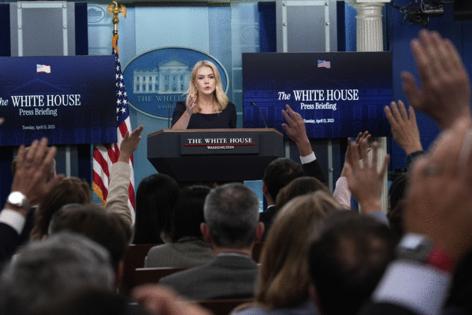White House moves to limit newswire access after AP's lawsuit win
Published in News & Features
WASHINGTON — The White House announced Tuesday that it was eliminating the traditional press pool access for wire services after a federal court ordered the administration to end viewpoint discrimination against The Associated Press.
The move will significantly reduce the traditional level of access for journalists from the AP, Reuters and Bloomberg News to the press pool, which cover the president in areas like the Oval Office and aboard Air Force One where space is limited.
The Associated Press sued the Trump administration in February when the White House began restricting reporters and photographers from the outlet after the wire service refused to update its style guide to rename the “Gulf of Mexico” the “Gulf of America” following a Trump executive order.
Last week, District Judge Trevor McFadden, a Trump appointee, ruled that the White House could not bar the newswire from covering the president in restricted areas because of its editorial decision. But McFadden also said he was not explicitly ordering the AP back into the pool, simply saying they needed to be treated similarly to other outlets.
The White House is appealing that ruling, but was unable to persuade the U.S. Court of Appeals for the D.C. Circuit to act on a request to temporarily stop McFadden’s order.
In response, the Trump administration and White House press secretary Karoline Leavitt moved to reshape the pool. Under new guidelines she issued Tuesday, wire services — which traditionally attend each presidential event — will simply be “eligible for selection” to cover events.
“Outlets will be eligible for participation in the Pool, irrespective of the substantive viewpoint expressed by an outlet,” Leavitt said in a memo.
While the White House has eliminated dedicated spots for wire services, it is maintaining specific spots for a print pooler, television network crew and radio journalists. It will also provide spots for a “new media” journalist, a secondary television network or streaming service, and four photojournalists.
The White House said that while it would generally maintain a rotation, Leavitt would “retain day-to-day discretion to determine composition of the pool.”
“This is necessary to ensure that the president’s message reaches targeted audiences and that outlets with applicable subject-matter expertise are present as events warrant,” she said.
©2025 Bloomberg L.P. Visit bloomberg.com. Distributed by Tribune Content Agency, LLC.







Comments